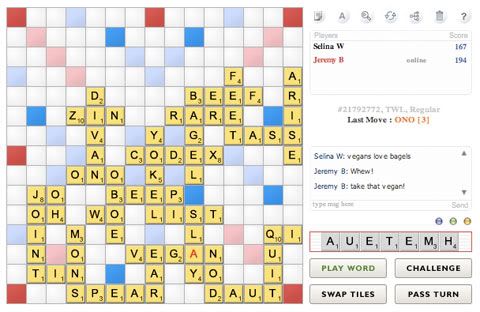There is an illegitimate version of Scrabble exploding in popularity on Facebook right now. It's called Scrabulous and it just landed in my network tonight. (Right now I'm winning thanks to "yokel" and "codex.") It has over three million registered users, 700,000 players a day (make that 700,001), and a juicy legal battle brewing. Two brothers from India are earning $25,000 per month in online ad revenue with a Facebook app based square-for-square on a 60 year-old board game currently owned by Hasbro (in the U.S.) and Mattel (abroad).

It's a simple implementation that feels fresh for a few reasons. Board games are social, but not scalable the way they are online. Scrabble is particularly well-suited to friend networks because it's a challenging text-based game played in sequential moves without time limits. People can start up multiple games easily and then play them out over generous lengths of time, a lot like chess players would trade moves over long distances by mail. Since it's so easy to cheat online, a big part of the fun is in holding yourself to the rules of the game and winning with your wits.
It's a wonder Hasbro and Mattel didn't think of this sooner. They do have plans with RealNetworks and Electronic Arts to release online versions of the trademarked game, but it doesn't look like these plans work within a thriving social network like Facebook. With the market for their board games stagnant, you'd think these companies would try to get their games in front of new customers in novel ways. Instead, with grand plans for new packaging and a folding deluxe board, they seem too comfortable where they're at already.
The two brothers who developed Scrabulous, Rajat and Jayant Agarwalla, are great examples of why the free market applied online works so well: you win by taking risks on a clear goal and trying lots of new things. They loved Scrabble and were frustrated with the options available to play online. They had an entrepreneurial spirit and turned their creation into a business. Eventually they listened to one their users' suggestions and refactored their application for Facebook and voila--it took off. If only Hasbro and Mattel had been as anxious to make their game fun and relevant! It'll be interesting to see how this battle plays out. Will those two companies buy out the Agarwallas or try to shut them down? What would you do if it were your move?
Ref. Online Scrabble Craze Leaves Game Sellers at Loss for Words in the NY Times